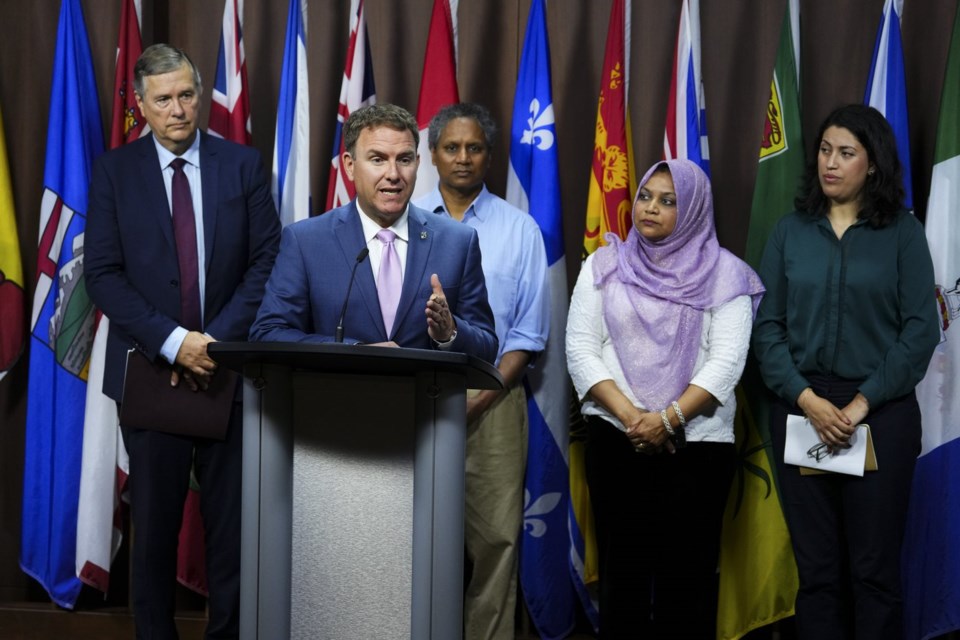OTTAWA — Representatives of Muslim and Jewish community groups said Tuesday it's time for governments, including Prime Minister Justin Trudeau's, to consider legislating extra protections around places of worship, schools and daycares.
Richard Marceau of the Canadian Centre for Israel and Jewish Affairs says the federal Liberals already have a "blueprint" for how it could work.
He pointed to legislation the Liberals introduced in 2021 that criminalized the intimidation of health-care workers and people seeking health services like COVID-19 vaccinations.
"It's not only a Jewish community problem," he said on Tuesday, appearing alongside other faith leaders at a press conference addressing hate.
"All other faith institutions...deserve as much protection."
Shaila Carter, who co-chairs the Canadian Interfaith Conversation and works with Islamic Relief Canada, echoed those comments, saying many Muslims feel targeted, especially after a family of four was killed in vehicle attack in 2021 in London, Ont.
"We should, as Canadians, be able to move forward safely, freely, happily with whatever faith we are," she said.
Police across Canada have been reporting an increase in hate crimes at synagogues, Jewish community centres, schools and mosques since the beginning of the Israel-Hamas war.
Hamilton police recently announced the arrest of a 37-year-old man, alleging he walked into a classroom inside a mosque and made "hate-related comments," and ripped up a copy of the Quran which he had carried in.
Bruce Clemenger of the Evangelical Fellowship of Canada said Tuesday the organization is still examining the issue of so-called bubble zones, referring to rules that say protests cannot take place with a certain perimeter around a place of worship.
He said the organization remains conflicted on the matter and believes there are other tools law enforcement can use.
Clemenger said many Canadians "grapple" with balancing free expression and protest and the "protection of vulnerable Canadians, of minorities."
"So we're examining the issue of the bubble zone to see whether that strikes a good balance."
Marceau pointed to the City of Vaughn near Toronto, which last month proposed a bylaw that would limit protest in front of what it calls "vulnerable community space," specifically citing synagogues and schools.
Mayor Steven Del Duca said in a statement announcing the move the by-law would target demonstrations that "cross the line."
In an open letter, the Canadian Muslim Public Affairs Council called for city council to undertake more consultation with the Muslim and Arab communities, saying establishing a 100-metre buffer zone around places like schools and places of worship needs to allow for what the Charter of Rights and Freedoms protects as peaceful assembly.
The letter also raised concern about the zone capturing other activities and questioned what enforcement could look like, underscoring it should be "proportional and non-discriminatory."
"Proceeding with the law as is in the current context of the war on Gaza will only be perceived as an attempt to limit freedom of speech and silence pro-Palestinian voices," it wrote in a recent post on X.
Federal Justice Minister Arif Vriani's office said in a statement on Tuesday that all people in Canada have a right to express themselves freely, including through worship.
Spokeswoman Chantalle Aubertin pointed to the government's Online Harms Act, which seeks to usher in stiffer penalties for hate-related crimes and create a new peace bond for situations where a judge hears evidence someone might be a risk of committing a hate-related crime.
"For example, if someone posts online that they intend to commit a crime targeting a particular religious community, a court could impose conditions requiring them to stay 100 feet away from their places of worship," she said in a statement.
Aubertin also pointed to existing sections of the Criminal Code that deal with threats and acts of intimidation.
“Minister Virani will always work to ensure that our criminal laws effectively meet their objectives, keep all Canadians safe, and are consistent with the Charter of Rights and Freedoms.”
This report by The Canadian Press was first published June 18, 2024.
Stephanie Taylor, The Canadian Press



